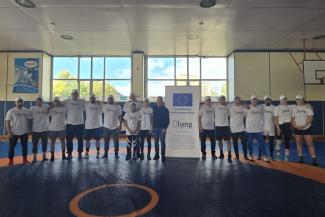#WrestleTokyo Greco-Roman Previews
Wednesday, June 23, 2021 - 21:04 By United World Wrestling Press

Greco-Roman Previews
60kg
The last time the Olympics were held in Tokyo, Japan won two gold medals in Greco-Roman wrestling. 57 years later, Kenichiro FUMITA (JPN) will have a chance to repeat the feat the world champion at 60kg leads the country's hope for a Greco-Roman Olympic champion in 37 years.
67kg
Big challenges lie ahead of returning Olympic champion Ismael BORRERO MOLINA (CUB). The first is he is making his return in a new weight category, eight kilograms above the 59kg in which won a gold medal in the Rio Olympics.
Five world champions appear in the category which may throw a surprise Olympic champion given a mix of youth and veterans at this weight.
77kg
Two-time defending Olympic champion Roman VLASOV's (RUS) reign as the top wrestler will be over after nine years. The winner of the gold medal in 2012 and 2016 failed to win the spot on the Russian team, which means a new Olympic champion will be crowned at this weight.
87kg
Zhan BELENIUK (UKR) will look to improve on the Olympic silver medal he won at the 2016 Rio Games. He won gold at the 2019 World Championships in Nur-Sultan, which was his second world title after claiming gold in 2015. The 30-year-old Beleniuk has five world medals and four European gold medals. Earlier this year, Beleniuk won gold at the Grand Prix of Zagreb before getting a bronze at the European Championships in April. He enters the Tokyo Olympics as the No.2 seed at 87kg.
97kg
One of wrestling's greatest rivalries could be renewed in Tokyo if the seeds hold. Musa EVLOEV (RUS) and Artur ALEKSANYAN (ARM), two of Greco-Roman's biggest stars, enter Tokyo Games as the top two seeds at 97kg. They have combined to win every world or Olympic title in this weight category since 2014.
130kg
Mijain LOPEZ NUNEZ (CUB) will look to make history at the Tokyo Olympics. The Cuban wrestling legend, who enters unseeded, has a chance to become the first four-time Olympic champion in Greco-Roman and the second wrestler in any style to accomplish the feat. (At the 2016 Rio Olympics, Japan's Kaori ICHO became the first four-time Olympic champion wrestler in any style.) The 38-year-old Lopez is not only unbeaten at the Olympic Games since 2008, but he has won five world titles and three world silver medals. Two of his three losses in world championship competition have come to Riza KAYAALP (TUR), who enters the Tokyo Olympics as the top seed at 130kg.


Share your thoughts.
Comments